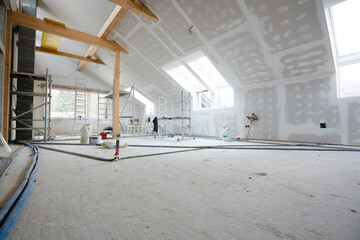Drywall Repair Costs

Drywall is a common building material that’s used throughout your home. But, like all construction products, drywall is susceptible to damage. A putty knife and drywall compound can quickly repair small holes and dents. Larger holes or cracks require more work. Read on Drywall Repair Las Vegas to learn more.

Drywall Repair is a common home improvement project, and the cost can vary widely. The price you pay depends on the type of drywall damage, the extent of the damages, and whether or not a section of drywall must be removed or replaced.
Small hairline cracks that can be patched with caulk and a new piece of drywall will cost $60, while extensive cracks that require wood supports, adhesive and a new drywall section can cost $330+.
Joints and seams that separate or lift away from the drywall can be repaired for an average of $120 to $360, with tape used to secure them. Larger joints or extending through multiple drywall panels may require removal and replacement to improve stability.
Labor costs make up 50-80% of the drywall repair price, depending on the size and complexity of the job. Oddly shaped drywall surfaces like corners, domes and archways will increase the labor cost by 20-40%.
Drywall is an essential part of the interiors of most homes, but it is also easily damaged. Small dents or holes can be repaired with spackle, but larger holes require replacement.
While some homeowners try to do drywall repairs independently, hiring a professional for more extensive work is best. This will save you time and money, as well as ensure that the repair is done correctly.
If you decide to handle a repair yourself, have all the tools you need. A sanding sponge, a mud pan, a putty knife, and a drywall patch kit are all important supplies for repairing drywall.
The type of drywall repair you need will determine your training and experience to complete it successfully. If you have little or no experience, receive training at a vocational school or apprenticeship program. Once you have the required skill and experience, you can begin working as a drywall specialist.
Drywall is a common material in residential homes and can easily become damaged. This damage can range from minor dings to large holes or cracks requiring a patch or new drywall.
Depending on the size of the hole, you’ll need to decide whether to try to patch it yourself or call a professional. Spackle and a putty knife can do the trick for small dents or holes.
Medium-sized holes or cracks will require a fiberglass mesh patch and drywall compound. You’ll need to purchase a patch kit and measure a replacement piece of drywall for larger holes.
These repairs are a great DIY project and can save you money on professional repair costs. However, it’s best to call in an expert if you’re dealing with structural or water damage.
Drywall is a type of wallboard that’s used in most homes. It’s a cheaper alternative to plaster and wood but can also be a serious health hazard.
Drywall contains gypsum and other additives that can cause severe lung damage. Workers are advised to wear masks, gloves, and safety glasses when handling drywall.
A major concern is drywall silica dust, which can irritate the lungs. It’s important to avoid sweeping or otherwise exposing yourself to this dust.
Other hazards of repairing drywall include repeated motions that can cause small muscle and joint injuries. Rotate your work and take breaks.
Drywall repair is the process of fixing or restoring damaged drywall surfaces. Drywall, or gypsum board or wallboard, is a commonly used building material that provides a smooth, even surface for walls and ceilings. However, it can become damaged over time due to moisture, impact, or normal wear and tear. Common types of drywall damage include holes, cracks, and water damage. The specific repair process will depend on the extent and cause of the damage and the type of drywall being repaired. Drywall repair may involve cutting out the damaged area, installing a new piece of drywall, and finishing the surface with joint compound and sanding.
Regular maintenance and timely repairs can help extend the lifespan of drywall surfaces and prevent more costly repairs. In some cases, a quick fix such as spackling may be sufficient. Hiring a professional drywall repair contractor can help ensure that repairs are done correctly and effectively.
